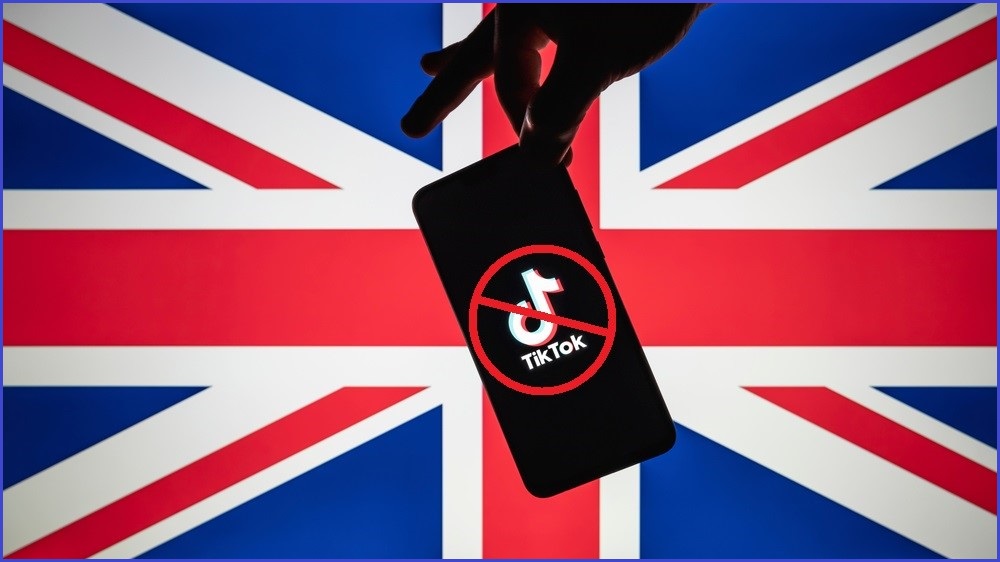Both New Zealand's parliament and the UK government are enacting bans against popular social media app TikTok, halting its use on government phones due to widespread data security concerns.
These bans follow long-standing suspicions that sensitive TikTok user data could be accessed by authorities in Beijing for data surveillance or espionage, leading the UK and New Zealand to enact similar restrictions to those already seen in the US, Canada and even the European Commission.
British authorities declared their respective ban on 16 March, voicing concerns over how TikTok uses the user data it collects and stores through the app.
A post on the UK government website detailed how TikTok requires users to grant the app access to personal data stored on their device – such as contacts, user content and geolocation data – which is then collected and stored by TikTok.
"The government, along with our international partners, is concerned about the way in which this data may be used," read the UK government post.
UK Cabinet Office minister Oliver Dowden said restricting the use of TikTok on government devices was a "prudent" and "proportionate" step following advice from cyber security experts.
"The security of sensitive government information must come first, so today we are banning this app on government devices," said Dowden.
Only one day after this UK ban was announced, New Zealand's parliament said it too will prohibit the Chinese-owned social media app from the phones of MPs.
New Zealand's Parliamentary Service chief executive Rafael Gonzalez-Montero said TikTok will be "removed from all devices with access to the parliamentary network" on advice from cyber security experts.
"This decision has been made based on our own experts’ analysis and following discussion with our colleagues across government and internationally.
"Based on this information the Service has determined that the risks are not acceptable in the current New Zealand parliamentary environment," said Gonzalez-Montero.
The New Zealand ban is set to take effect towards the end of March, with some wiggle room for those who require the app in order to "perform their democratic duties."
Why is TikTok being banned?
TikTok has faced lasting scrutiny not only for its data harvesting practices, but also for fears the app could be used by the Chinese state for international espionage.
ByteDance, a Beijing-based internet company, owns TikTok and is potentially subject to China's National Intelligence Law of 2017, which dictates all organisations and citizens shall "support, assist and cooperate" with national intelligence efforts and "protect national intelligence work secrets."
This effectively raises the possibility that Chinese officials could demand access to TikTok user data, leading security experts to voice concerns over the app's data privacy.
The potential lapse in national security and data privacy introduced by the National Intelligence Law has spurred politicians in the UK, US, New Zealand and Australia to levy criticism at the social media app, and is largely accountable for the wave of bans now happening across the globe.
TikTok sticking up for itself
TikTok Vice President for Europe, Theo Bertram, voiced disappointment over the UK decision to ban TikTok on government devices, saying the choice was driven by "wider geopolitics" unrelated to the social media company and its users.
"TikTok's parent company is ByteDance but ByteDance is not a Chinese company," said Bertram.
"TikTok and ByteDance are not Chinese companies. UK data is stored in Singapore and US, not in China.
"China cannot compel another sovereign nation to hand over data. We've never received a request for UK data and would refuse if we did," he said.
According to the Financial Times, China has recently moved to take "special management shares" in tech giants Alibaba, Tencent, and TikTok-owner ByteDance – a play which enables the Communist party to stay involved in certain business decisions within the organisations.
In the United States, the Biden administration has reportedly threatened an outright ban of TikTok across the country, where the app has about 150 million users, unless its Chinese owners sell off their shares.
China's foreign ministry criticised this alleged ultimatum by pointing out a lack of provided evidence, then accusing the US of "spreading disinformation" about data security.
"The US should stop spreading disinformation about data security, stop suppressing the relevant company, and provide an open, fair and non-discriminatory environment for foreign businesses to invest and operate in the US," said ministry spokesperson Wang Wenbin.
Further bans loom over Australia
Further bans are anticipated in Australia, where nearly half of all federal government agencies have reportedly banned the app on government-owned devices.
Liberal Senator James Paterson, the Shadow Minister for Cyber Security, has echoed international criticisms of TikTok and pushed for even wider bans of the app – spanning government through to everyday Australians.
“The Albanese government must stop dragging their heels and join our closest allies to ban TikTok from government-issued devices – we cannot afford to fall any further behind in protecting government users,” said Paterson.
“They must also step up to ensure any solution, including a forced sale developed by the Biden administration, applies to Australian users too.”
While Australia is yet to introduce a mandatory blanket ban, state governments are increasingly broaching the subject of TikTok and social media apps within their own policies.
New South Wales, Canberra and Western Australia governments have all undertaken recent considerations over whether to ban the app within their public sectors, and experts are predicting a ban will likely occur at a federal level in coming weeks.
The federal government is expected to receive a pivotal Home Affairs Department review into the security risks of social media platforms, including TikTok, by the end of March.










